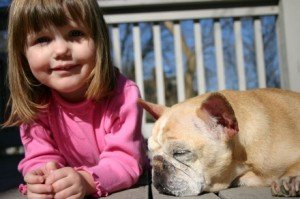 French Bulldogs develop age-related ailments just as we do. Though the time of onset of “The Golden Years” varies, your Frenchie may begin to show some signs of aging at about 7 or 8 years, and be considered old at about 10. Your vet will help you decide when your dog is showing signs of age. These signs may involve weight changes, arthritic problems which can alter mobility, decreased function in the internal organs (heart, kidneys, liver), cancers, hormone changes like diabetes and thyroid problems, etc.
French Bulldogs develop age-related ailments just as we do. Though the time of onset of “The Golden Years” varies, your Frenchie may begin to show some signs of aging at about 7 or 8 years, and be considered old at about 10. Your vet will help you decide when your dog is showing signs of age. These signs may involve weight changes, arthritic problems which can alter mobility, decreased function in the internal organs (heart, kidneys, liver), cancers, hormone changes like diabetes and thyroid problems, etc.
When you and your vet decide that your Frenchie is getting old, put together a geriatric health plan. Begin with geriatric lab work that includes urinalysis, stool exam (to detect parasites, blood, or signs of pancreatic malfunction), hematology (red and white blood cells, platelets) and blood chemistry tests that include tests for liver, pancreas and kidney functions. And of course the annual heartworm test is a must. This lab work will give you a “baseline” to which later test results can be compared. Subtle change in the lab results can help you detect diseases in the early and treatable stages, before symptoms appear. If your dog is in good health, a geriatric blood profile should be done annually until around age 10 or so, when it is a good idea to do it every six months.
Our aging dogs’ physical and mental changes mirror our own. It’s usually easier to notice the physical ones. The immune system is less efficient, so wound healing and the response to infection may be reduced. Incontinence can develop, and this may be a sign of a hormonal or a neurological problem, or of kidney failure.
Various nutritional changes may occur. Unexplained weight loss could be due to diminished absorption of nutrients by the aging gut. Obesity due to reduced physical activity or slower metabolism should be controlled, as excess weight stresses the old joints, the heart, and the kidneys. Consult your vet about whether a special geriatric diet is indicated.
Senior Frenchies may have diminished sensory functions (vision, hearing, taste, smell, even touch), and if this happens, they tend to react more slowly to environmental stimuli. An alert owner will recognize these subtle, slow, and progressive changes, and will give the dog more play and stimulation to help keep it sharp, mentally and physically. Behavioral changes and alterations in the dog’s thought processes can also emerge, and early detection may help you and your vet devise a way to treat these before they become disabling. An exercise program that will keep the dog active without being too stressful helps keep it in good mental and physical health.
If an older dog should require surgery, or anesthesia for any reason, lab work should be done beforehand if possible, preferably within 2 weeks of the planned procedure. Individualized tests and screening can help your vet decide on the safest anesthesia and drugs, and can alert her to any risks. Pain assessment and management is also important, and needs to be tailored to the individual. If a doghas chronic pain or acute pain, it must be managed appropriately and safely in order to help your friend enjoy its twilight years.
You are your dog’s best friend and should be alert to any changes, because the subtle signs of a problem are key to early diagnosis and treatment. Watch out for these signs of problems, and consult your vet immediately if you notice any of them.
• Sudden weight change (gain or loss)
• Decreased appetite or refusal to eat for more than a couple of days
• Increased appetite
• Increased thirst / urination that is marked and sustained
• Diarrhea that lasts more than about 3 days
• Difficulty with urination or defecation
• Frequent vomiting
• Inability to chew dry food
• Incontinence
• Diminished vision or hearing
• Lameness persisting more than a few days or involving more than one leg
• Blood in urine or stool
• Excessive panting (may be a sign of pain)
• Heavy or rapid breathing when at rest
• Coughing/gagging that persists
• Seizures
• Hair loss
• Abdominal distention
• Open skin sores that don’t heal within a week or so
• Drooling that persists, or excessively bad mouth odor
